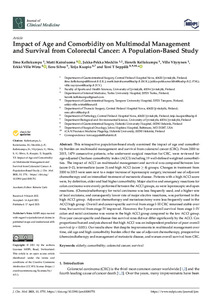Impact of age and comorbidity on multimodal management and survival from colorectal cancer : A population-based study
Kellokumpu, Ilmo; Kairaluoma, Matti; Mecklin, Jukka Pekka; Kellokumpu, Henrik; Väyrynen, Ville; Wirta, Erkki Ville; Sihvo, Eero; Kuopio, Teijo; Seppälä, Toni T. (2021-04)
Kellokumpu, Ilmo
Kairaluoma, Matti
Mecklin, Jukka Pekka
Kellokumpu, Henrik
Väyrynen, Ville
Wirta, Erkki Ville
Sihvo, Eero
Kuopio, Teijo
Seppälä, Toni T.
04 / 2021
1751
Julkaisun pysyvä osoite on
https://urn.fi/URN:NBN:fi:tuni-202109247264
https://urn.fi/URN:NBN:fi:tuni-202109247264
Kuvaus
Peer reviewed
Tiivistelmä
This retrospective population-based study examined the impact of age and comorbidity burden on multimodal management and survival from colorectal cancer (CRC). From 2000 to 2015, 1479 consecutive patients, who underwent surgical resection for CRC, were reviewed for age-adjusted Charlson comorbidity index (ACCI) including 19 well-defined weighted comorbidities. The impact of ACCI on multimodal management and survival was compared between low (score 0–2), intermediate (score 3) and high ACCI (score ≥ 4) groups. Changes in treatment from 2000 to 2015 were seen next to a major increase of laparoscopic surgery, increased use of adjuvant chemotherapy and an intensified treatment of metastatic disease. Patients with a high ACCI score were, by definition, older and had higher comorbidity. Major elective and emergency resections for colon carcinoma were evenly performed between the ACCI groups, as were laparoscopic and open resections. (Chemo)radiotherapy for rectal carcinoma was less frequently used, and a higher rate of local excisions, and consequently lower rate of major elective resections, was performed in the high ACCI group. Adjuvant chemotherapy and metastasectomy were less frequently used in the ACCI high group. Overall and cancer-specific survival from stage I-III CRC remained stable over time, but survival from stage IV improved. However, the 5-year overall survival from stage I–IV colon and rectal carcinoma was worse in the high ACCI group compared to the low ACCI group. Five-year cancer-specific and disease-free survival rates did not differ significantly by the ACCI. Cox proportional hazard analysis showed that high ACCI was an independent predictor of poor overall survival (p < 0.001). Our results show that despite improvements in multimodal management over time, old age and high comorbidity burden affect the use of adjuvant chemotherapy, preoperative (chemo)radiotherapy and management of metastatic disease, and worsen overall survival from CRC.
Kokoelmat
- TUNICRIS-julkaisut [16983]
